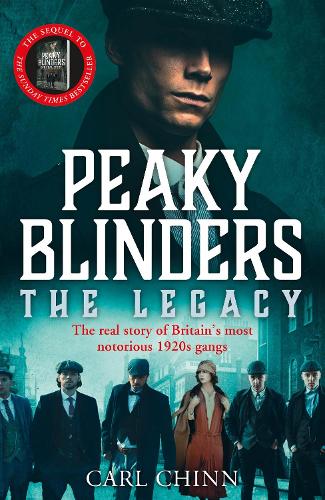
Peaky Blinders: The Legacy - The real story of Britain's most notorious 1920s gangs: As seen on BBC's The Real Peaky Blinders
(Paperback)
Available Formats
Paperback
Published: 5th November 2019
Paperback
Published: 15th February 2022
Paperback
Published: 1st December 2020
Paperback
Published: 2nd December 2025
Publishing Details
Peaky Blinders: The Legacy - The real story of Britain's most notorious 1920s gangs: As seen on BBC's The Real Peaky Blinders
By (Author) Carl Chinn
John Blake Publishing Ltd
John Blake Publishing Ltd
1st December 2020
17th September 2020
United Kingdom
Classifications
General
Non Fiction
Local history
Organized crime
364.1066094109042
Physical Properties
Paperback
352
Width 128mm, Height 198mm, Spine 27mm
318g
Description
From the Sunday Times bestselling author, Carl Chinn
The Peaky Blinders as we know them, thanks to the hit TV series, are infused with drama and dread. Fashionably dressed, the charismatic but deeply flawed Shelby family have become cult anti-heroes.
Well-known social historian, broadcaster and author, Carl Chinn, revealed the true story of the notorious gang in his bestselling Peaky Blinders: The Real Story and now in this follow-up book, he explores the legacy they created in Birmingham and beyond. What happened to them and their gangland rivals
In Peaky Blinders: The Legacy we revisit the world of Billy Kimber's Peaky Blinders, exploring their legacy throughout the 1920s and 30s, and how their burgeoning empires spread across the UK. Delve into the street wars across the country, the impact of the declaration of War on Gangs by the Home Secretary after The Racecourse War in 1921, and how black-market bookmaking gave way to new and daring opportunities for the likes of Sabini, Alfie Solomon and some new faces in the murky gangland underworld.
Drawing on Carl's inimitable research, interviews and original sources, find out just what happened to this incredible cast of characters, revealing the true legacy of the Peaky Blinders.
Author Bio
Professor Carl Chinn MBE Ph.D. is a social historian with a national profile, writer, public speaker, and teacher. An off-course bookmaker himself until 1984, he is the son and grandson of illegal bookmakers in Sparkbrook, and the great-grandson of a peaky blinder, whilst his mother's family were factory workers in Aston. His writings are deeply affected by his family's working-class background and life in the back-to-backs of Birmingham and he believes passionately that history must be democratised because each and every person has made their mark upon history and has a story to tell.
